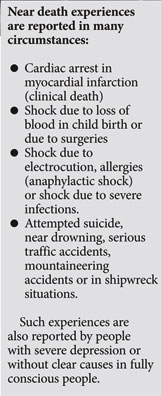Not quite the norm
Near death and out of the body experiences:
Near death experience is the reported memory of all impressions
during a special state of consciousness, such as out of body experience,
pleasant feelings, seeing a tunnel, a light, deceased relatives or a
life review.
Psychologist defined the near death experience as the time of
clinical death where a patient is unconscious due to insufficient blood
supply to the brain because inadequate blood circulation, breathing or
both. In this situation, if resuscitation is not started within 5-10
minutes, irreparable damage is done to the brain and the patient will
die.
 Some
people report near death experience (NDE) after a life threatening
crisis. A longitudinal study was conducted in Netherlands between
2001-2009, which included 344 cardiac arrest patients who were
successfully resuscitated. The study was conducted among two groups, one
group of cardiac patients who had a cardiac arrest with a near death
experience (62) or 18%, and in the other group of cardiac patients who
did not have a near death experience. This research studied the medical,
pharmacological and psychological experiences among the two groups. The
occurrence of the near death experience was not associated with duration
of cardiac arrest or unconsciousness, medication, or fear of death
before cardiac arrest. Some
people report near death experience (NDE) after a life threatening
crisis. A longitudinal study was conducted in Netherlands between
2001-2009, which included 344 cardiac arrest patients who were
successfully resuscitated. The study was conducted among two groups, one
group of cardiac patients who had a cardiac arrest with a near death
experience (62) or 18%, and in the other group of cardiac patients who
did not have a near death experience. This research studied the medical,
pharmacological and psychological experiences among the two groups. The
occurrence of the near death experience was not associated with duration
of cardiac arrest or unconsciousness, medication, or fear of death
before cardiac arrest.
Significantly, in this study, more patients who had a near death
experience, especially deep experience, died within 30 days after
resuscitation.
Extraordinary experience
The researchers did not know, why so few cardiac patients reported
near death experience after resuscitation, but they thought it could be
explained by the age of the patients, memory power and brain damage
during the cardiac arrest. Some people who have survived a life
threatening crisis report an extraordinary experience. Near death
experience occurs with increasing frequency because of improved survival
rates resulting from modern techniques of resuscitation.
The content of near death experience and the effects on patients seem
similar worldwide, across all cultures and times. The subjective nature
and absence of a frame of reference for this experience lead to
individual, cultural, and religious factors determining the vocabulary
used to describe and interpret the experience.
Several theories on the origin of near death experience have been
proposed. Some Psychologists think the experience is caused by changes
in the brain, such as brain cells dying due to lack of oxygen and
nutrients.
Another theory is that the near death experience is due to changing
state of consciousness, in which perception (feelings), cognitive
functioning, emotion, and sense of identity, functioning independently
from normal body waking consciousness or dissociation from the body.
 Patients
who have undergone (survived) a near dear death experience has
transformational process in their lives so they do not have fear of
death and they accept any subsequent eventualities in a very rational
way. Patients
who have undergone (survived) a near dear death experience has
transformational process in their lives so they do not have fear of
death and they accept any subsequent eventualities in a very rational
way.
Death-bed wishes
Similar experiences to near-death can occur during the terminal phase
of an illness, and are called death-bed wishes.
Good short-term memory seems to be essential for remembering near
death experiences. Patients with memory defects after prolong
resuscitation reported fewer experiences.
Similar to near death experience can be inducted through electrical
stimulation of some parts of the brain (temporal lobe and the
hippocampus of the brain), with high carbon dioxide when the brain does
not have enough oxygen), and in drug addicts (especially with LSD &
Ketamine). These inducted experiences can consist of unconsciousness,
out of body experiences, and seeing of light flashes of recollection
from the past.
These recollections, however, consist of fragmented and random
memories unlike the panoramic life-review that occurs in near death
experiences. Further, transformational processes with changing life
insight and disappearance of fear of death are not reported after
induced experiences. The most important point to consider hear is that
the clear consciousness outside one's body the person experiencing at
the moment, when the brain no longer functions (flag EEG recording).
The same happens when there is cardiac arrest (flat ECG), and when
there is flat EEG (brain is not functioning). Furthermore, blind people
(blind from birth), describes similar out-of-body experience during
cardiac arrest or when the brain is not functioning (flat ECG & EEG).
More research should be conducted to explain scientifically the
phenomena of near death experiences. It should be focused on specific
elements such as out-of-body experience and transcendence.
- Dr. R.A. Ranjith Perera M.B.B.S. (Cey), M.Sc. (Psych.) Col.
O.A.C.C.P.P. (Can), C.Psych. (Can) C.Ht. (U.S.A.) PHD. (Cd.) |

